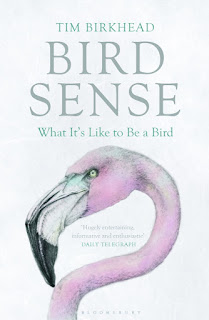Sunday, November 20, 2011
A sense of wonder
An underlying theme of the nature symposium I attended last week was a sense of wonder. One speaker introduced the day by reminding us that the word is used in different ways: we wonder about things as in curiosity and enquiry; and we wonder at things, in amazement, awe and disbelief.
Tim Birkhead is a lecturer and scientist who studies avian ecology- he encompassed both these concepts in what to me was the highlight of the meeting. His soon to be published book Bird Sense: What it's like to be a bird explores the extraordinary abilities of birds to perceive the world in ways we can barely imagine.
We've known for a long time that many species can focus at a great distance, picking out detail with a clarity our best lenses can't achieve. We know too that some raptors, Kestrels, for instance, can detect the ultra-violet trails of rodents - experiencing what to us would be a 'new' colour, a concept that has fascinated me since I was a child. But to learn that some can also visualise magnetism, left me incredulous.
Birkhead explained that in studying migrating birds, scientists found the presence of magnetite in their beaks and brains; this compound of iron oxides allows them to orientate to the earth's magnetic field, a process known as magnetoception. But more recently they have also discovered that some birds synaptically connect the magnetite to one of their eyes (usually the left one), literally seeing the earth's magnetic fields.
When you think about that, it is just astonishing. It makes our human abilities seem so limited, exposing our perceived 'superiority' as the hubris it is. Consider how long it has taken, what effort and technology we have had to develop, in order to simulate what geese can do without thinking.
There was more to wonder at too. I never knew that Kiwis used their acute sense of smell to locate worms with absolute precision. Or that many owls have one ear at two-o-clock on the dial and the other at seven - and are able to locate prey in total darkness with one degree of accuracy vertical and horizontal. I could go on, but it would only baffle us further.
I was curious too about the wider implications. For here science touches on philosophy, by illustrating just how limited our own perceptions and experiences are. Emmanuel Kant declared we can never know the world as it truly is. Birkhead tacitly acknowledged this, and significantly he talked of how scientific knowledge allows us to 'judge' what it's like to have these senses - that's a very different thing to actually experiencing them.
Scientific knowledge is also limited, and Birkhead left us with some of the more mind bending natural phenomena we're yet to understand - how, for example, do migrating flamingos 'know' when it's rained at their target destinations, only starting their thousand mile journeys when enough has fallen? This and many other questions remain beyond us - a source of wonder in every sense of the word.
Subscribe to:
Post Comments (Atom)

An excellent post Mark, that raises many questions and certainly also raises a sense of wonder at the natural world.
ReplyDeleteI love the fact that we still know so little about the world. It means that we will always have new discoveries to make.
You've given me so much to think about in this post...and would you be kind enough to tell me when Mr. Birkhead's book is published as it is one that my husband will want to read.
ReplyDeleteI read this with much interest too. It lead me to make comparisons with humans who have a sensory impairment. Despite having severe learning difficulties, some of the children I've worked with managed to hone their functioning senses to an impressive degree. One profoundly deaf and blind boy would get very excited about 5 minutes before the headteacher made an appearance - he could smell her perfume long before anyone else.
ReplyDeleteA truly fascinating post, Mark, and one that makes me want to know more. I'm with Fly in wanting the book you mention for my husband who would be so interested in it.
ReplyDeleteThe book is due to be published in February and there is a website about it already. http://bird-sense.com/
ReplyDeleteTim Birkhead has written other books that are worth looking at too
How mundane it makes our senses seem... and yet how magical ours must be when compared to those of an amoeba for example.
ReplyDeleteThanks. That was wonderful. I appreciate anything that helps me understand more about migratory birds. Any birds really but those that fly from north to south and vice versa with such precision, I am in awe of.
ReplyDelete